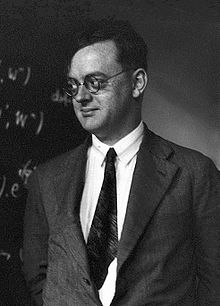
Back باسكوال جوردان Arabic باسكوال جوردان ARZ پاسکوال جردن AZB Pascual Jordan BS Pascual Jordan Catalan Pascual Jordan Czech Pascual Jordan German Pascual Jordan EO Pascual Jordan Spanish پاسکوال جردن FA
Pascual Jordan | |
|---|---|
 Pascual Jordan in the 1920s | |
| Born | Ernst Pascual Jordan 18 October 1902 |
| Died | 31 July 1980 (aged 77) |
| Nationality | German |
| Education | Technical University of Hannover University of Göttingen |
| Known for | Quantum mechanics Quantum field theory Canonical commutation relation Matrix mechanics Neutrino theory of light Zero-energy universe Skew lattice Jordan algebra Jordan–Brans–Dicke theory Jordan and Einstein frames Jordan map Jordan–Wigner transformation Pauli–Jordan function |
| Awards | Ackermann–Teubner Memorial Award (1937) Max Planck Medal (1942) Konrad Adenauer Prize (1971) |
| Scientific career | |
| Fields | Theoretical physics |
| Institutions | University of Rostock University of Berlin University of Hamburg |
| Doctoral advisor | Max Born |
| Doctoral students | Jürgen Ehlers Engelbert Schücking Wolfgang Kundt |
Ernst Pascual Jordan (German: [ˈɛʁnst pasˈku̯al ˈjɔʁdaːn]; 18 October 1902 – 31 July 1980) was a German theoretical and mathematical physicist who made significant contributions to quantum mechanics and quantum field theory. He contributed much to the mathematical form of matrix mechanics, and developed canonical anticommutation relations for fermions. He introduced Jordan algebras in an effort to formalize quantum field theory; the algebras have since found numerous applications within mathematics.[1]
Jordan joined the Nazi Party in 1933, but did not follow the Deutsche Physik movement, which at the time rejected quantum physics developed by Albert Einstein and other Jewish physicists. After the Second World War, he entered politics for the conservative party CDU and served as a member of parliament from 1957 to 1961.
- ^ McCrimmon, Kevin (2004). A taste of Jordan algebras (PDF). New York: Springer. ISBN 0-387-95447-3.